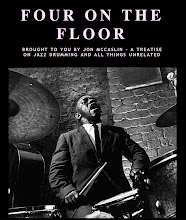Patrick is an incredibly articulate and creative musician and I have learned an immense amount from him both on the bandstand and while sharing a pint or two (or several!!!) at the Duke of York.
So without further adieu, may I present the ever informative Mr. Patrick Boyle:

I'm thrilled to contribute a guest post on Four on the Floor. Jon and I are doctoral students at the University of Toronto. Over the years, and many beers, we've had countless conversations about our individual influences and education. We are kindred spirits (i.e. jazz nerds) to be sure. Even though we grew up in different parts of Canada (Newfoundland and Saskatchewan, neither exactly hotbeds of jazz music) we share a number of significant influences. Jazz radio was important, especially the CBC. All of this leads me to the topic of this short post: in the context of jazz music, what constitutes one's musical personality?
Jazz school is a funny thing. There are grades/evaluations involved, yet one of the founding principles of the music is to discover and project your own uniqueness within and through the genre. Would Monk get into an undergrad jazz program in 2010? Or Don Cherry? Ornette? It's hard to say, I guess it would depend on the openness of the particular program. It's fun to consider what institutions think is important.
My personal belief is that the best thing we can do is show students as broad a range of improvisational techniques, devices, and parameters as possible, and attempt to instill the imperative that it is their responsibility to CHOOSE which techniques, devices, and parameters mean the most to them. Then, when that sound you desire is in your head, you have to really believe in it. As I've been mulling the creation of unique personalities, I've been considering what happens within classical music. How do performers who rely on a score work alongside and away from the necessities of their genre to project their uniqueness? Obviously, it happens all the time. Glenn Gould and Leonard Bernstein are two fine examples.
Both share what I think is the key quality of any musician, jazz or otherwise: conviction. Conviction implies a certain amount of fearlessness. I am very interested in those musicians who take a great deal of liberty with the guidelines given on score in a provocative manner, but not for the sake of being provocative. Leaving yourself so open to critique can be hard to do, and both Gould and Bernstein are extremely articulate on and off stage. Check out Bernstein discussing the glacial tempo taken by Gould in Brahms Piano Concerto.
Ok, so I can't contribute to Jon's blog without adding something jazz related. We were both at this incredible gig on a cold night in January 2008. Dave Liebman, Mike Murley, Jim Vivian, and Ian Froman at the Rex. Four of the most convicted blokes around.




















No comments:
Post a Comment